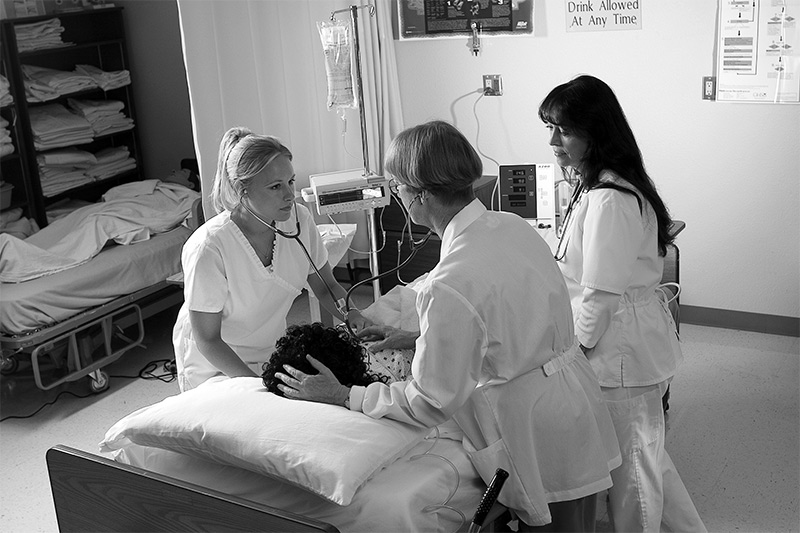Training reinforces the role of humanities in nursing and hospice care
Some define hospice care as a junction between the clinical, empirical practice of medicine and the humanities. On Monday, October 7, HopeWest will partner with CMU to assist nursing students at an end-of-life simulation lab. Participants will face realistic end-of-life scenarios in the simulation lab. The training will call on skills that are unique and necessary for hospice care. Many of these skills – empathy, patience, compassion and understanding – come from the humanities.
“Hospice and CMU working together makes all the sense in the world," said Lucy Graham, PhD, RN. “A hospice nurse, or any nurse, who through specialized training develops a deep sense of the patients' needs can truly enhance the comfort of a patient during one’s passage from life.”
HopeWest professionals involved in the simulation training agreed with Graham.
“Hospice care is unique because traditional, clinical skills are necessary, but our nurses must also begin helping the patient process the existential questions about their life,” said Meghan Munoz, HopeWest senior director of clinical practice & education. “It’s important for our nurses to have a deep sense of empathy so they can better do their job – providing comfort, dignity and satisfaction.”
While hospice nursing requires empathic skills and sensitivities to the story of a person’s life – it also involves a deep understanding of technical skills.
“There is a misconception that nurses will lose their skills if they work in hospice care, but that’s not true,” said Munoz. “Most of the time, hospice nurses practice autonomously in patients homes, so this requires a firm understanding of assessment skills and critical thinking concepts. At HopeWest, we train our nurses to conduct these assessments and interventions, which evaluate physical, emotional and spiritual well-being. Having these skills can prevent a crisis for both the patient and family.”
Hospice diverges from traditional nursing in that once engaged, the inevitability of death is acknowledged. The mission of nursing is to provide comfort in the face of that inevitability.
“The comfort we provide isn’t just physical but also psychological,” said Felicia Waltz, HopeWest director of clinical education. “Often extended families are involved, who in and of themselves, come with a diversity of experience, beliefs, ideas and opinions about what should be taking place in terms of care. Balancing these variables is part of the job of a hospice nurse.”
Barry Laga, department head of Languages, Literature, and Mass Communication, points out that the humanities are alive and well in each profession and human endeavor, it’s just that the way we talk about the humanities doesn’t expressly acknowledge this fact.
“The humanities, through art and literature, offer a repository of stories, scripts, role models, choices, beliefs, values and language to providing life with meaning,” said Laga. “When it comes to the role of the humanities in hospice and palliative care, it’s easy to see where hospice practitioners could help a patient and their families see a human not just as a body, but as a complex individual with spiritual, physical, social, aesthetic and psychological needs.”
The simulation lab was created to help current nursing students assess interest hospice care as a career. Hospice staff at HopeWest use the term “career” lightly because many believe that hospice nursing is as much a calling as a traditional career. HopeWest serves people of all races, religions, ages, cultural backgrounds and belief systems. They individualize the end-of-life experience for patients that account for those differences. Striving to construct an appropriate end-of-life care strategy requires nurses who have a high level of empathy. For many, the humanities foster, develop and enhance a person’s capacity for empathy.
“We allow patients to bring their pets to our Care Center and have even honored the requests of a patient to visit his horse one last time,” said Waltz. “While not always easy, we have found that doing so provides a great deal of comfort, closure and relief for these patients.”
Human beings, despite all our differences, share the inevitability of birth and death as shared experiences. HopeWest celebrates the ability to make end-of-life a time for reflection, comfort, and demonstrates what it means to be a human being. HopeWest is also proud to partner with CMU who teaches the humanities.
